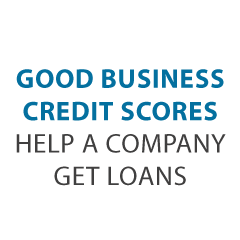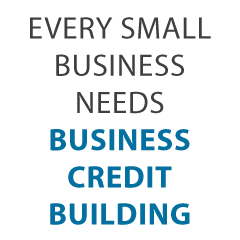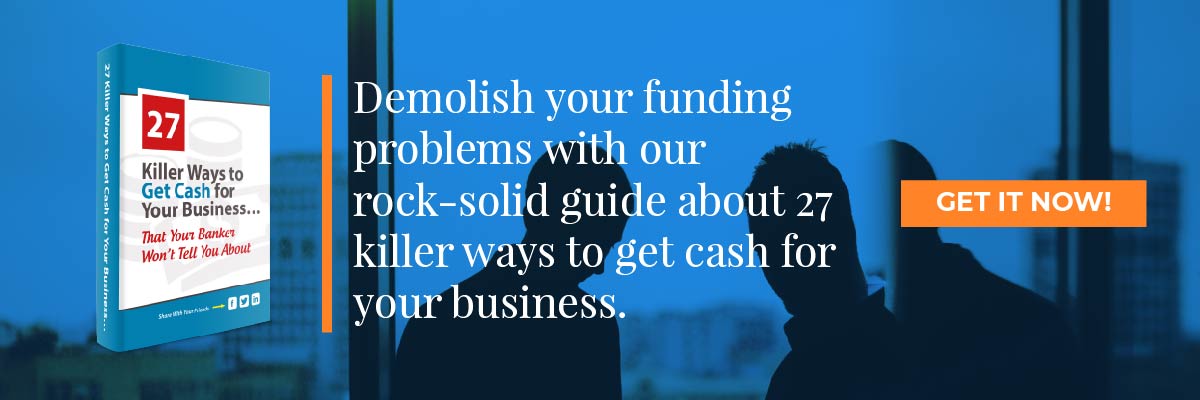- Connect With Us!
- (877) 600-2487
- info@creditsuite.com
The More You Know the More You Grow: Your Essential Guide to Available Business Funding Types
Published By Faith Stewart at February 18th, 2019
Everything You Need to Know to Choose the Best Available Business Funding Types for Your Business
There are many options when it comes to funding your business. All of them move your business toward the same goal. That is the goal of success. That is where the similarities between available business funding types ends however.
Some of them require a personal guarantee. This means they will do a credit check on your personal credit score. Others rely on your business credit. There are those that only care about receivables or open invoices. Some options do not even require repayment.
Which ones will work best for you and your business? It depends. You have to know more about each of the available business funding types before you can make an educated decision. It is necessary to know the differences between them, what the qualifications are, and if you even have access to them before you can begin to think about making a decision.
We break it down for you here in our essential guide so you can make the best decision possible for your business.
Traditional Term Loans
 These are the loans that you go to the bank to get. As a business, your business credit score can help you get some types of funding even if your personal score isn’t awesome. That isn’t necessarily the case with this type of funding however.
These are the loans that you go to the bank to get. As a business, your business credit score can help you get some types of funding even if your personal score isn’t awesome. That isn’t necessarily the case with this type of funding however.
With a traditional lender term loan, you are almost always going to have to give a personal guarantee. This means they will check your personal credit. If your personal credit score isn’t in order, you will likely not get approval.
What kind of personal credit score do you need to have in order to qualify for a traditional term loan? If you have at least a 750 you are in pretty good shape. Sometimes you can get approval with a score of 700+, but the terms will not be as favorable.
If you have really great business credit, your lender might be more inclined to be a little more flexible. However, your personal credit score will still weigh heavily on the terms and interest rate.
Of all of the available business funding types, this is the hardest to get. It is usually worth the trouble though if possible, because it often has the best rates and terms.
SBA Loans
These are traditional bank loans, but they have a guarantee from the federal government. The Small Business Administration, or SBA, works with lenders to offer small businesses funding solutions that they may not be able to get based on their own credit history. Because of the government guarantee, lenders are able to relax a little on the personal credit score requirements.
In fact, it is possible to get an SBA microloan with a personal credit score between 620 and 640. These are very small loans, up to $50,000. They may require personal collateral as well.
The trade-off with SBA loans is that the application progress is lengthy. There is a ton of red tape connected with these types of loans.
Hit the jackpot with our best webinar and its trustworthy list of seven vendors who can help you build business credit.
Business Line of Credit
This is basically the traditional lender’s version of a business credit card. The credit is revolving, meaning you only pay back what you use, just like a credit card. Rates are typically much better than a credit card. The application and approval process, however, is more similar to that of a traditional term loan.
If you need revolving credit and can qualify for a term loan, this is the best of the available business funding types for you. It is great for bridging cash gaps and covering short term expenses without the high credit card interest rates.
There are no cash back rewards or loyalty points, though. This makes some business owners prefer business credit cards in some cases, despite higher interest rates.
Need to Know Tip #1
When you apply for financing from traditional lenders, they will always ask for certain information. This is regardless of whether you are applying for a line of credit, an SBA loan, or a traditional term loan. You will need to provide, at a minimum:
- A complete, professional business plan if you are a startup
- Complete company financial statements or tax returns for recent years
- A list of owners or officers
- Personal financial information, including bank account balances and credit history
While this list is not exhaustive, it is a good start for what you need to have together before you begin the application process for these types of business funding.
Invoice Factoring
If you are an established business with accounts receivable, invoice factoring is one of the available business funding types that you have access to. This is where the lender buys your outstanding invoices at a premium, and then collects the full amount themselves. You get cash right away, without waiting for your customers to pay the invoices.
This is a good option if you need cash fast, or you do not qualify for other available business funding types. The interest rate varies based on the age of the receivables.
Need to Know Tip #2
If you accept credit cards, you may be able to get a merchant cash advance. This is similar to invoice factoring, but instead of buying your open invoices, the lender advances cash based on expected credit card sales.
Non-Traditional Lenders
These are lenders other than traditional banks and credit unions that offer terms loans. Usually they operate online. Occasionally they will have a brick and mortar location as well. The difference between these and traditional lenders is that the loans have looser approval requirements and a much faster application process. Most often you can simply apply online, get approval in as little as 24 hours, and the funds are in your account within 24 to 48 hours after approval.
These are an option if your personal credit isn’t terrible and you need funding fast.
Need to Know Tip #3
There has been an explosion of non-traditional lenders onto the scene in recent years. Some are better than others. Be sure to research each one thoroughly. Check them out on the Better Business Bureau website and read online reviews to get a good start.
Crowdfunding
 Crowdfunding is a newer option for finding investors. While the average Joe that wants to start a business needs funding, it is not always possible to find one or two large investors. With crowdfunding, you can literally have a “crowd” of investors fund your business $5 and $10 at the time.
Crowdfunding is a newer option for finding investors. While the average Joe that wants to start a business needs funding, it is not always possible to find one or two large investors. With crowdfunding, you can literally have a “crowd” of investors fund your business $5 and $10 at the time.
There are many crowdfunding sites, but the most popular are Kickstarter and Indiegogo. The platforms are similar but there are some important differences. The most obvious is the timing of when you actually receive the funds that other invest in your company.
Kickstarter requires a preset goal, and you do not receive your funds until you reach your goal. For example, if you set a goal of $10,000 when you start your campaign, you will not receive any money that investors offer up until you reach that $10,000.
Indiegogo requires a goal as well, but they offer the option to receive funds as you go if you prefer. They also have an option called InDemand. This program allows you to continue raising funds after your original campaign is over without starting a whole new campaign. It is more of an extension of the first one.
There are other crowdfunding sites out there as well. Different ones work better for certain businesses and vendors. To determine which one you might have the most luck with, you will need to do some research. Keep in mind your type of business and the specific business each one appeals too.
Need to Know Business Tip #4
Crowdfunding is a good starting point for a new business, but it shouldn’t be relied upon completely. You need a backup plan. Only a small percentage of crowdfunding campaigns are successful. Also, consider the state of the economy before you rely to heavily on crowdfunding. If the economy isn’t booming, people will not be as likely to invest.
Grants
While there are not a lot of these out there, this branch of the available business funding types tree is more common that you think probably. Typically, these are offered by professional organizations. There are some government grants available also. Competition can be stiff, but they are definitely worth a shot if you think you may qualify.
While requirements vary from grant to grant, and most are only awarded to a certain number of recipients, this is of one of the available funding types worth looking into if you fall into one of these basic categories.
- Women owned business
- Minority owned business
- Businesses run by veterans
- Businesses in low income areas
There are also some corporations that offer grants in a contest format that do not require much other than that you meet the corporation’s definition of a small business and win the contest.
Where to Start If You Want to Find Small Business Grants
Federal government small business grants run through the Small Business Administration, but they are rarely awarded directly to a business. Instead, they award the grant to local nonprofits or governments to disburse as grants to small businesses in their communities. To find these, check with local economic development agencies and governmental entities to find out what available business funding types they have.
Another place to look is the local Small Business Development Center, or SBDC. These offer support to local small businesses and are generally related to a local college, university, or economic development center.
As a general rule, they do not offer grants themselves. They can, however, point you in the right direction. They know where the money is, who qualifies, and how to start the application process. These agencies also offer many other services to small businesses, making them a great resource regardless.
Corporate grants are another great option if you do business in an area where they are available. Companies like FedEx and LendingTree have grant contests each year.
The FedEx grant is open to any business that has been in operation for at least 6 months and has 99 employees or less. They award eight $7,500 grants, one $15,000 grant, and one $25,000 grant to winners each year. LendingTree also offers a grant annually of $50,000.
Need to Know Tip #5
Grants are a great possibility at any stage of business. Similar to crowdfunding however, they shouldn’t be counted on too heavily. Funds are limited and competition is fierce. A backup plan is definitely necessary if you are planning to use the funds for a specific purpose.
Hit the jackpot with our best webinar and its trustworthy list of seven vendors who can help you build business credit.
Business Credit Cards
These may get a bad rap, but in lieu of another option, they can actually do the trick quite nicely. The allure is that these are available much more readily even with a credit score that isn’t awesome. To be fair, the lower the credit score, the higher the interest rate. Also, there are limits on how low they will go with a credit score.
However, this is one of the available business funding types that most of the general public are eligible for at any given time. They do a credit check, but your credit doesn’t have to be as high as it would be to gain approval for a traditional loan.
The downside of business credit cards is that they typically have a high interest rate. The upside is that many of them offer rewards in the form of cash or points that can be helpful.
Need to Know Tip #6
Apply for business credit cards with your business name and EIN to get them without a personal credit check. If you do not yet have a business credit score, you need to get one. Find more about how to establish and build business credit here.
Best Uses for Each of the Available Business Funding Types
Which of the available business funding types you should use in any given situation depends on many variables. The biggest piece of the puzzle is which types of funding you are eligible to receive. However, there really is more to it than that. Assuming you are eligible for all types of financing, here are some other factors to consider.
Startup
In the startup phase, there are a couple of things to think about when determining which of the available business funding types might work best for you.
If you fall into one of those categories that make grants an option, that is the best first stop. Grants are free and clear. That money is yours, without repayment, to use in your business. They typically do not rely on success of the business or the credit worthiness of the owner. The business or proposed business only has to meet the requirements set forth to apply, and then win the grant.
Crowdfunding is also a viable option here, but there has to be a backup plan in case the goal isn’t met.
Traditional term loans are a good idea for the startup phase also, if you qualify. The interest rates and terms are generally more favorable than other types of financing for those that meet the credit requirements.
If you do not meet the credit requirements for traditional term loans, then non-traditional lenders are the next best option. They may have higher interest rates, but they do the trick. Plus, they can help build your business credit score if you make your payments on time.
While not impossible, it is not usually a good idea to start a business using credit cards if it an be avoided. Of course, invoice factoring is not an option here as you have to already be in business to have the invoices necessary.
Growth
There are several different aspects of growth that can benefit from various available business funding types.
Increase Inventory
If you see the potential for higher demand and need to increase inventory to accommodate, a revolving credit line is going to work best.
If already in place, these are instantly available to meet the cash needs that a large inventory purchase creates. They also allow for taking advantage of special pricing when available.
A business line of credit works well due to the lower interest rate, business credit cards will work in this situation also. In fact, if they have really great rewards attached to them, they could even be the better option. It can’t hurt to have both available if you have that luxury so that you have choices.
If available, grants work well for growth projects also.
Equipment
For large equipment, it is best to use traditional term loans of some sort if possible. This is simply because these are typically longer term loans for larger amounts. Lower interest rates and favorable repayment terms are key. We all know, however, this isn’t always possible. In a pinch, other available business funding types can work for this purpose as well.
Grants may be an option if there is not a time crunch. If time is of the essence, it is possible to purchase equipment on credit cards, but you could run into problems with cost versus credit limit.
Expansion
If you want to add on to your current building or add an addition location, term loan financing is the best option. Whether it needs to come from a traditional or non-traditional lender will depend on your specific situation.
Hit the jackpot with our best webinar and its trustworthy list of seven vendors who can help you build business credit.
Working Capital
Working capital is the cash you have available to run your business. Everything from payroll to repairs, maintenance, seasonal cash gaps, and emergencies are all things working capital covers.
Working capital can come from various available business funding types. There are working capital loans available, but lines of credit and business credit cards can work in these situations also. Unless you already have a working capital loan before the need arises, it is likely you are going to need to access business credit cards or some form of non-traditional financing for this.
In a pinch to cover a cash gap, a merchant cash advance or invoice factoring can work well.
The Number of Available Business Funding Types is Mindblowing: The More You Know About Each One the Better
It doesn’t matter what type of business you own or whether or not you need funding at this moment. If you own a business you need to know what the available business funding types are, which ones you currently qualify for, and how to qualify for those that are not currently available to you.
You also need to know which types of funding work best in various situations. Once you know these things, you can make an informed decision about how to best fund your business in each stage.

 " class="attachment-blog-single size-blog-single wp-post-image" alt="Get Business Credit Cards for New Businesses Credit Suite-Business Line of Credit Decoded" title="Get Business Credit Cards for New Businesses">>
" class="attachment-blog-single size-blog-single wp-post-image" alt="Get Business Credit Cards for New Businesses Credit Suite-Business Line of Credit Decoded" title="Get Business Credit Cards for New Businesses">>